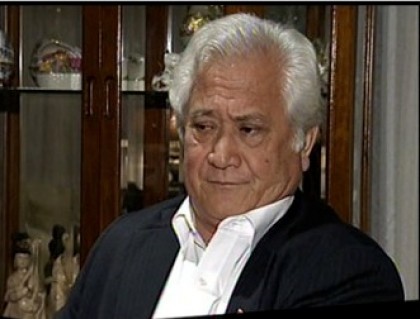
A damning report by the Royal Commission of Inquiry into the sinking of the MV Princess Ashika submitted to King George Tupou V yesterday, stated the key causes of problems that led to the August 5 disaster last year, were both a failure to conduct due diligence and a failure of leaders to perform their duties properly.
“The evidence as to the unseaworthiness and appalling state of the vessel is overwhelming and compelling,” the report stated.
Seventy-four lives were lost when the Ashika capsized on its fourth voyage since being commissioned by the Tongan government in July 2009. Thirteen were children under the age of 10.
Only two of the victims’ bodies were recovered and the rest, like the vessel itself, remain at the sea bed, too deep to salvage.
“The tragedy is that they were all easily preventable and the deaths were completely senseless,” read the report.
“It was scandalous that such a maritime disaster could ever have been allowed to occur. It was a result of systemic and individual failures.”
General causes, causes at the ‘heart’
The 657-page report, made up of 14 chapters, was submitted by the three commissioners, Chairman Justice Warwick Andrew, former Supreme Court judge of Tonga, naval architect and engineer, Richard Alexander James, and master mariner, Michael Keith Handfield.
The findings were compiled after 54 days of hearings, which began last October and adjourned indefinitely on March 12.
The report outlined the general causes of the disaster as such:
• Purchasing the MV Princess Ashika, even though its design was totally unsuited for service in the open seas of Tonga.
• Purchasing the vessel, even though it was clearly in an unseaworthy and unsafe condition.
• Allowing the vessel to be sent to sea, even though its design was totally unsuited for service in the open seas of Tonga.
• Sending the vessel to sea, even though it was clearly in an unseaworthy and unsafe condition.
However, the report also stated that at the “heart” of the above causes was:
• The failure of those in authority, when exercising their powers or performing their duties, to do so properly and adequately.
• The failure to have independent due diligence conducted prior to both the purchase of the vessel and its operation in Tonga.
It also included detailed examinations of the actions carried out by Ashika operator Shipping Corporation of Polynesia (government-owned), the Cabinet ministers, all key figures in the case, crew members, the Tonga Maritime Polytechnical Institute, the Ministry of Transportation as well as Ports Authority, and other parties and issues.
‘Horrendous condition’
The Commissioners cited over 100 photographs, video footage of the vessel lying on the seabed, and various oral accounts showing its “horrendous and frightening condition”.
They referred to the suggestions that the ferry was “well maintained”, made by the head of Shipping Corporation of Polynesia (SCP) John Jonesse and former Minister of Transport Paul Karalus, as “not only patently absurd, but dishonest.”
Instead, the Royal Commission of Inquiry agreed with the statement made in annual survey of the vessel by the Fiji Islands Maritime Safety Administration (FIMSA), about six months before its arrival in Tonga.
The surveyor’s report, submitted at the Inquiry as Exhibit 44 read: “The vessel is now 36 years old and the condition it is now in if it is allowed to trade will cause a Maritime Disaster and will be the cause of pollution. It is about time the vessel be condemned for good since its condition will continue to deteriorate further. The vessel is beyond repair and is no longer fit for sea services of any nature. “
The Royal Commission of Inquiry also noted that during hearings, Prime Minister Sevele “was defensive in many of his responses and refused to accept the obvious.”
No due diligence by Cabinet, Transport Ministry or SCP
The urgent need for an inter-island ferry in Tonga was identified by the Tongan Cabinet in 2008.
In a rush to find a replacement for Tonga’s other inter-island ferry, the MV Olovaha, the Commissioners found that due diligence was by-passed by various officials.
The ship was purchased “as is”, on May 8th 2009 from Fijian operators Patterson Brothers, for a non-negotiable bulk payment of FJD$600,000.
The report said the Cabinet, the SCP and the Ministry of Transport all failed to conduct due diligence in the purchase of the vessel, ultimately resulting in the disaster.
Criminal charges and civil responsibility
No recommendations were made for any criminal or civil responsibility charges. This would be left to the courts and the appropriate authorities.
However, as part of its term of reference, the Royal Commission outlined relevant laws regarding criminality and civil responsibility in the case, including manslaughter by negligence and certain offences under the Shipping Act, various provisions under the Royal Commissions Act, as well as laws relating to breach of contract, negligence, breach of statutory duty and the tort of misfeasance in public office.
None of the findings or statements by the Commission will be admissible in any civil or criminal proceeding except in the case of perjury.
The details of this report will be made available to the Tongan public next Tuesday.



